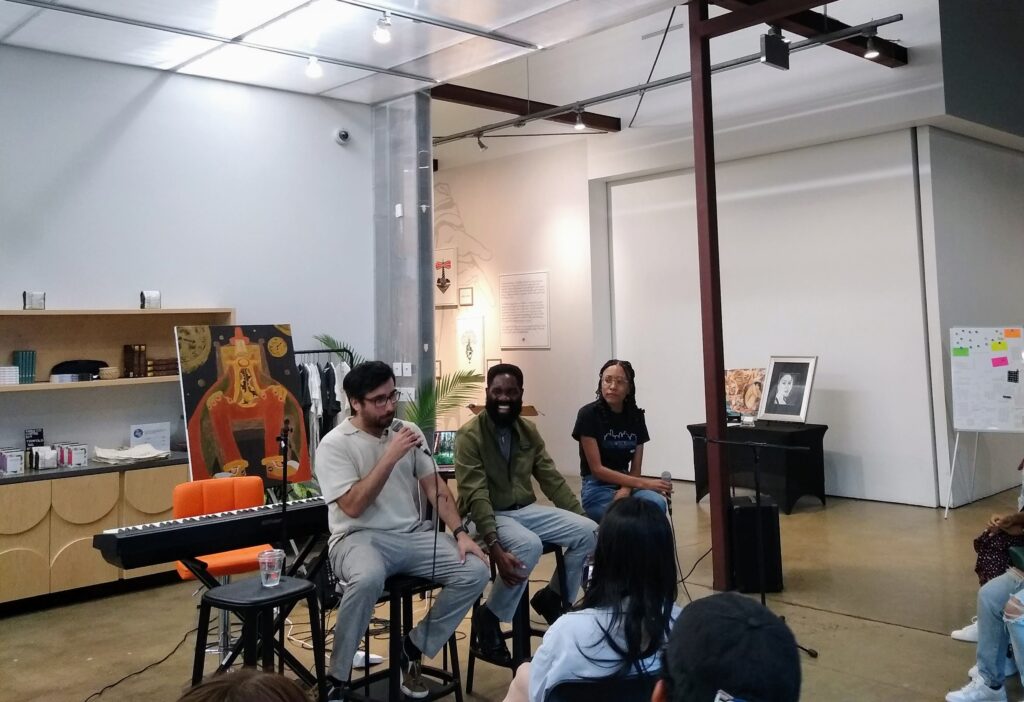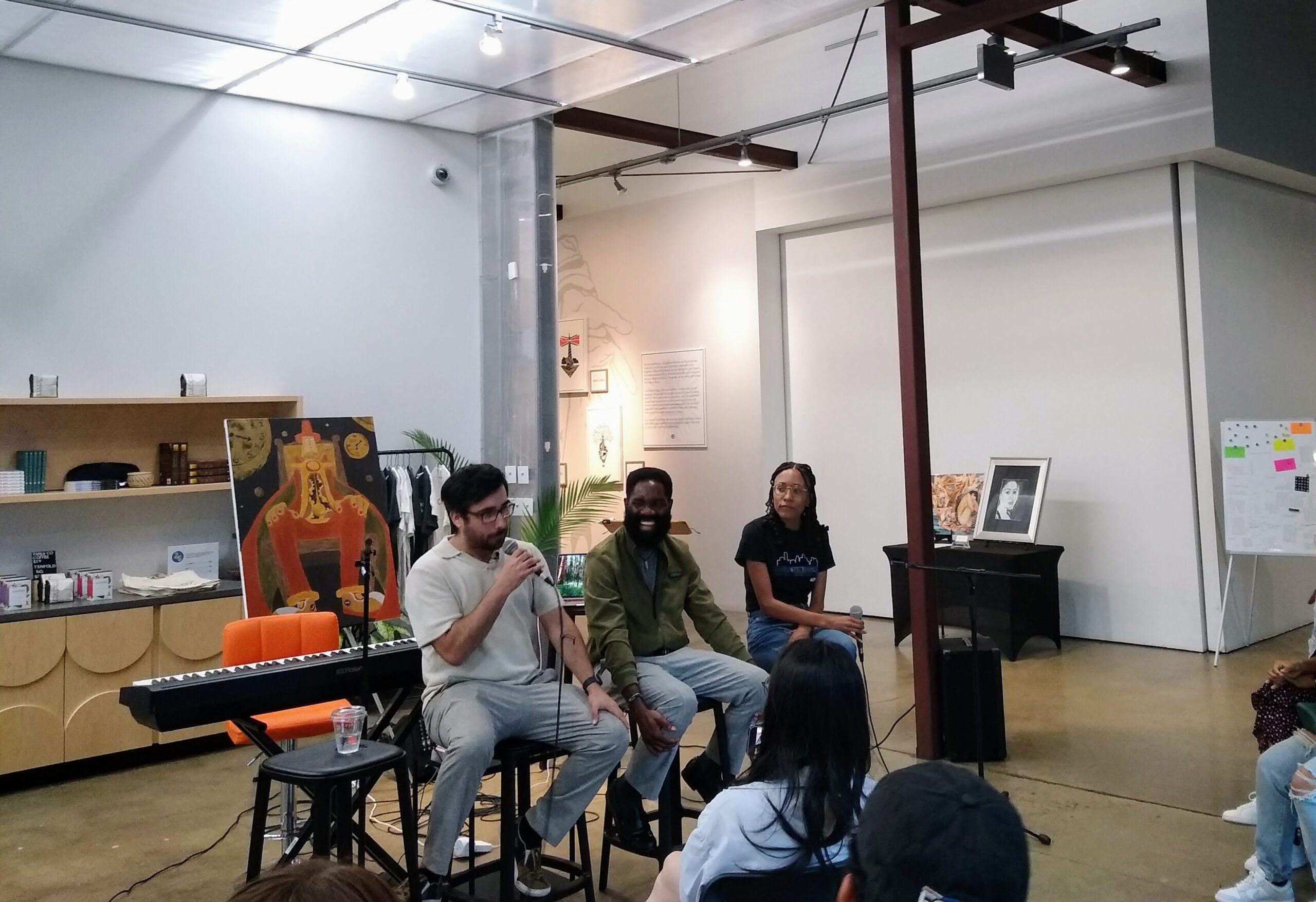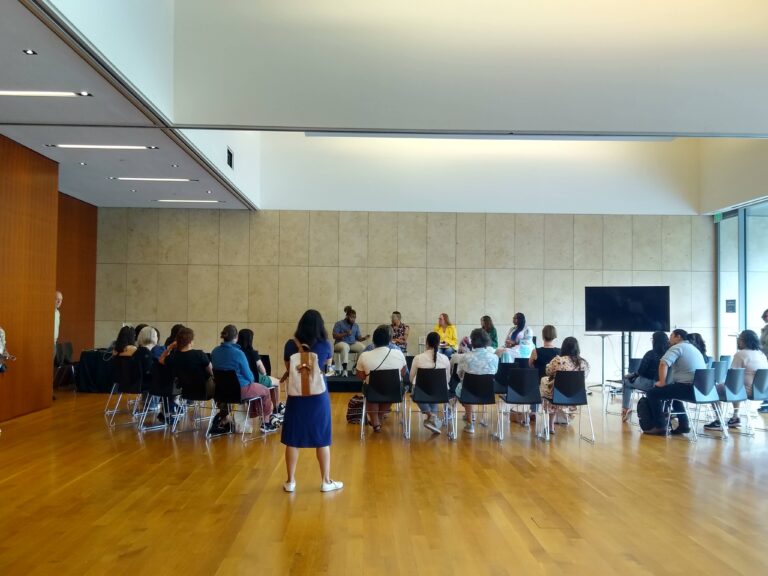Poetic Perspectives: Exploring the Multiverse and Our Multiple Selves
The day called for curling up with a good book, sheltered from April showers. Yet stronger was the call to be in community at Paper Co. Cafe for Poetic Perspectives, a poetry reading with art, coffee, and friends. This event was hosted by BIPOC Book Fest and Pendlum Productions in anticipation of BIPOC Book Fest 2025 in Houston. I thoroughly enjoyed last year’s book fest, which deepened my understanding of what it means to live a literary life. Poetic Perspectives also proved to be a quality event by highlighting two local poets and bringing people together. The featured poets, Fernando J. Moguel and Ayokunle Falomo, differed in poetic voice and subject matter, but coincided in their exploration of fact, fiction, and everything in-between.
Fernando J. Moguel: Building a Multiverse Poem by Poem
A seated figure was painted across a large canvas in brown, red, and yellow tones. Behind him, clocks were suspended in space, yet his body also housed time itself. His name was Mr. Pendlum, a character from Fernando J. Moguel’s Mr. Pendlum’s Compendium: The Illustrated Multiverse Vol. 1. The poetry book draws from diverse fields of knowledge, ranging from astrophysics to mythology. Moguel is a Mexican American author, educator, and multi-disciplinary artist who heeded the call to write early in life.
Fernando J. Moguel shared the breadth of his work with us, starting with the first books he wrote and illustrated as a child in manila folders with paper. When reciting poems from Mr. Pendlum’s Compendium, he sometimes used his own, original musical accompaniment. Afterwards, he gave us a sneak peek into other recent projects like Tome Terra and the Alt Atlas. Moguel’s poetic voice is playful, informative, and inquisitive as he explores scientific concepts, historical figures, and more. The rhythm and cadence of the poems were engaging and fun to listen to. If there was musical accompaniment, it added an immersive dimension.
Two musical poems that stood out to me were “The Zero Universe” and “Siddhartha.” Math has never been my strong suit, yet I enjoyed listening to the number zero explore the mutations of its own identity. Meanwhile, in “Siddhartha,” the poetic voice touched on Buddhist philosophy by reflecting on Buddha’s meditation under the Bodhi tree and the fluidity of water. As Moguel mentioned during the event, the book is for both children and adults alike. I would add that it speaks volumes when a person who dislikes math, such as myself, enjoys a poem about zero!
Ayokunle Falomo: Reflections on Self and Beyond
Ayokunle Falomo is a Nigerian and American author and speaker whose most recent poetry book is Autobiomythography of. I was drawn in by the idea of questioning reality and myths, both inherited and created, in an exploration of identity, voice, fatherhood, and more. The book is a mix of genres, as the title suggests. Falomo was adept at connecting with the audience, diving into deep topics while adding a bit of humor along the way. Moreover, his poetic voice is conversational and personal, as well as perceptive and inquisitive.
In “Notes Toward a Conjugated Theory of the Self,” Falomo’s poetic voice speaks through a letter, narrative prose, a chat bot conversation, and a poetic stream of consciousness. The poem opens with an online search of his own name: Ayokunle Falomo. It is the type of search that many of us in the audience admitted to doing with our own names out of curiosity. Yet, this curiosity becomes so much more as the poetic voice delves into their different selves, land, language, body, and family. I thought of the ways I get caught up thinking about all the “what ifs” in my life, our limits and freedoms, and the present.
Another poem that caught my attention was “Intro to Semantics,” which meditated on language and family in a different way. Falomo builds tension and contrast in the poem between the innocence of his daughter learning grammar and the language of loss and violence. Specifically, the poetic voice reflects on their role as a poet and father in shaping words for a war-torn world. I was touched by what Falomo shared and appreciated the chance to learn more about his perspective. I look forward to reading more of his work in the future.
The Artistic Process and Identity
The Q&A was moderated by BIPOC Book Fest’s Brooke Lewis. I was surprised to see how much Moguel and Falomo had in common with their answers. For example, they both fight against perfectionism. Falomo feels like he needs to “abandon” the poem, while Moguel says he needs to force himself to stop. During this segment, the electricity went out, as if the thunderstorm was seeking to end the event itself. But instead, it turned out to be a brief pause as the lights came on, inviting us to continue.
An audience member asked about the influence of other languages, which both authors acknowledged in terms of worldview and perspective. Moguel reflected on English and Spanish, including a reference to Jorge Luis Borges’ thoughts on the richness of English. On the other hand, Falomo spoke about Yoruba, its structure, and syntax. Both poets also spoke about finding themselves in an in-between space. Falomo articulates it as “our space,” in which we can make of it what we want. From Moguel’s perspective, we are a pastiche, or collage, of the different things that make us who we are. I thought both were great ways to encompass our multitudes.
From Perspective to Action
BIPOC Book Fest’s Poetic Perspectives was a warm, cozy refuge from the rain to spark curiosity, introspection, and creativity. From Fernando J. Moguel’s multiverse to Ayokunle Falomo’s multi-genre poetry, we could all learn and inquire not only about the world around us, but ourselves. Both poets demonstrated various ways to use our voice to inspire, educate, and connect with others. Interestingly, I attended the event without the intention of writing about it. However, the more I thought about it, the more I felt the need to share my experience. I thought about the poetry board in the cafe and how I didn’t leave behind a verse. I thought about all the other pieces of paper I’ve left blank. So, I wrote.





This is a wonderful article! I truly love how you captured the details of the event; it brings it alive in my mind as I read! Thank you for this treasure!
You’re very welcome, Fernando! I’m glad that you enjoyed the article. Thanks for creating and giving back to the community. Keep up the remarkable work!